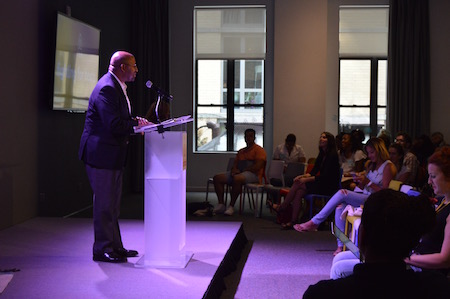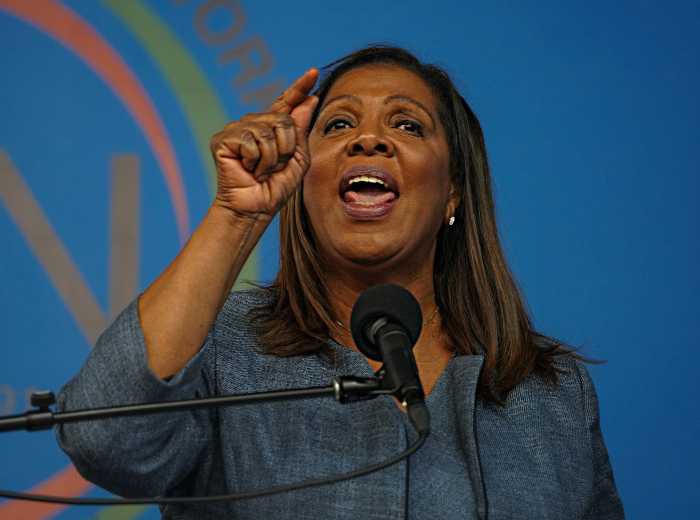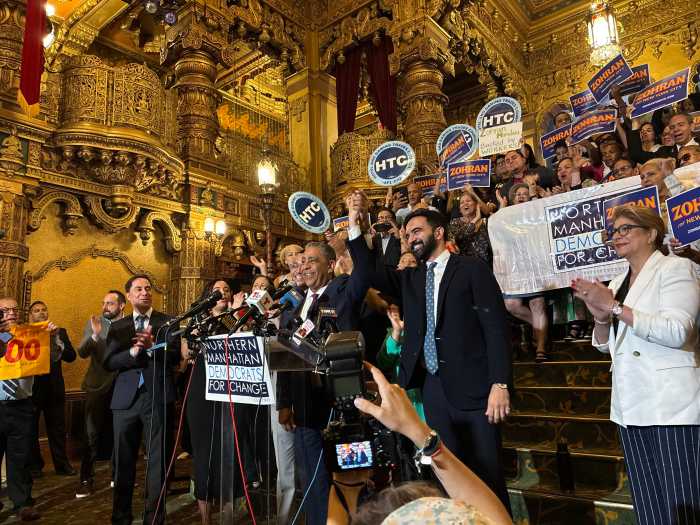
BY JACKSON CHEN & PAUL SCHINDLER | To counter the threat of legislation passed earlier this year by the State Senate and Assembly, Airbnb, on September 10, launched a Fighting for Hosts campaign aimed at forestalling the possibility that Governor Andrew Cuomo will sign the measure.
During a Host Day New York event in Manhattan, the home-sharing company, based in San Francisco, announced the campaign and conducted workshops and networking for Airbnb hosts, who advertise their homes for short-term rental on the company’s site.
“We… stand behind our host community and are prepared to give them the resources they need to defeat the flawed laws pushed by special interests,” Josh Meltzer, Airbnb’s head of New York public policy, said. “Hosts’ voices need to be heard and lawmakers need to know that targeting middle class New Yorkers for simply sharing their own home with visitors is not without consequence.”
Airbnb’s campaign comes as Cuomo weighs legislation that would impose steep fines for advertising, in any media, home rentals for less than 30 days, which is illegal in New York State. Under the bill, first-time offenders would be hit with a $1,000 fine that would increase to $5,000 for the second offense and $7,500 for the third strike.
While the bill’s proponents emphasize the impact that landlords renting out units short-term — and thereby creating “illegal hotels” — has in reducing available affordable housing, Airbnb counters that the “vast majority” of “hosts” participating in the market are renting out their own homes.
“The majority of Airbnb’s users are commercial operators who often warehouse dozens and even hundreds of apartments which would otherwise be available to hard-working New York families,” Upper West Side State Assemblymember Linda B. Rosenthal, the bill’s sponsor, said in a release earlier this year explaining the measure. “As we desperately try to fight to stem the loss of precious units of affordable housing, Airbnb’s presence in New York City is contributing to such a rapid loss of affordable housing that we simply cannot replace the units as fast as they are being lost to Airbnb. It must be stopped.”
Meanwhile, she asserted, tenants who rent out their own apartments may be doing so illegally and, so, “often face hefty fines and even eviction.”
Airbnb, she charged, “refuses to notify New Yorkers of the responsibilities under the law, [so] it is crucial that we do so. This bill will protect tenants against preventable eviction and will help them to stay in their homes.”
In a September 6 letter to Cuomo and legislative leaders, however, Airbnb’s general counsel, Rob Chestnut, argued that the “vast majority” of its hosts occupy the apartments they are renting out and that the company supports “efforts to protect permanent housing by discouraging commercial operators from using our platform.”
Since last November, Chestnut said, the company’s site has purged 2,570 New York City listings Airbnb believes “pose the risk of taking permanent housing off the market.”
The company is introducing TV and online ads through November aimed at rallying public support for its business, in part by providing data on the benefits middle and working class New Yorkers enjoy from being able to rent out their homes on a short-term basis.
Of the nearly 40,000 “hosts” in New York City, Chestnut wrote, 96 percent list a single property and earn $5,300 a year from renting their homes out for an average of three days a month. His letter emphasized the benefits of hosting for African Americans, women, especially women seniors, millennials, and those living in economically “vulnerable communities.”
Chestnut pointed to recent legislation approved in Chicago that distinguishes between commercial operators creating illegal hotels and individuals renting out their own homes.
Even as Chestnut emphasized the benefits of Airbnb, he made clear that should Cuomo sign the legislation, the company is prepared to “immediately commence litigation.”
Support for the measure Cuomo is mulling is diverse, suggesting there is concern both about large landlords keeping units off the long-term rental market and about individual tenants making extra money by subletting for brief periods. While hotel workers and affordable housing advocates complain that illegal hotels undercut unionized labor and reduce available housing options in the city, some large landlords are concerned about their tenants profiting from short-term renters but sharing none of those proceeds.

The company’s September 10 event featured a high profile advisor to Airbnb, former Philadelphia Mayor Michael Nutter, who also contrasted New York’s pending legislation with regulations adopted elsewhere, including his home town.
“There are a number of concerns about the pending legislation,” Nutter said of the bill awaiting Cuomo’s signature. “It seems to not differentiate between responsible New Yorkers who share their own home and the commercial operators who actively remove permanent housing from the market.”
But Rosenthal is not alone in her view that the real problem posed by “home-sharing” is the incentives landlords now have to skirt existing restrictions on short-term rentals and create illegal hotels.
In late 2014, New York State Attorney General Eric Schneiderman released a report showing “widespread illegality” in Airbnb listings in New York City, with more than 100 operators, each controlling 10 units or more, booking nearly 50,000 reservations between 2010 and 2014. At that time, Schneiderman asserted, up to 72 percent of Airbnb listings in New York were illegal.
Last year, Upper West Side City Councilmember Helen Rosenthal and her Washington Heights colleague, Ydanis Rodriguez, proposed legislation that would double the maximum penalty for illegal hotel operators to $50,000, with additional daily fines also doubled, to $2,000.
“In 2014, over 35,000 residences in New York City were used as hotel rooms through Airbnb, and nearly two thirds were used illegally,” Councilmember Rosenthal said in a release announcing the legislation. “That’s over 25,000 homes, many of which are rent-regulated apartments, that New Yorkers can no longer access. Our current fines are too low to deter illegal hotel operators, some of whom made millions in the last year alone. By increasing fines for illegal hotels, getting a violation will no longer be the cost of doing business.”
Nutter, in remarks at the Airbnb event, insisted there is a way for legislation to find a compromise between the state and the city’s goal of removing illegal hotel operators from the market and the benefits responsible apartment dwellers can realize from short-term rentals of their homes.
“There are certainly reasonable and responsible ways to legislatively figure out how to protect the housing market and work with Airbnb to protect responsible home-sharers and create provisions to actually crack down on what are, in essence, illegal hotels,” he said.
An across-the-board assault on Airbnb rentals, Nutter warned, will hurt average New Yorkers.
“There are also concerns about new significant fines that could be imposed on middle class people who are already struggling to get by,” he said. “Someone who’s operating an illegal hotel… could probably handle a $7,500 fine, but for most middle class families, it could possibly break the bank.”
Hosts, like Cate Schuller, who lives in Midtown East, said the additional fines under the pending legislation would kill the golden goose. She said she welcomes all of her guests as “the person I wish I had met when I first moved to New York” and is prepared to fight any new curbs.
“I always think that if you worry about something it actually gives it more power,” Schuller said about the possibility that fines could bar her from participating in Airbnb. “If it’s a worse case scenario, I’m just not giving in. I’ll go up to Albany, anything I can do to be a good host.”





































